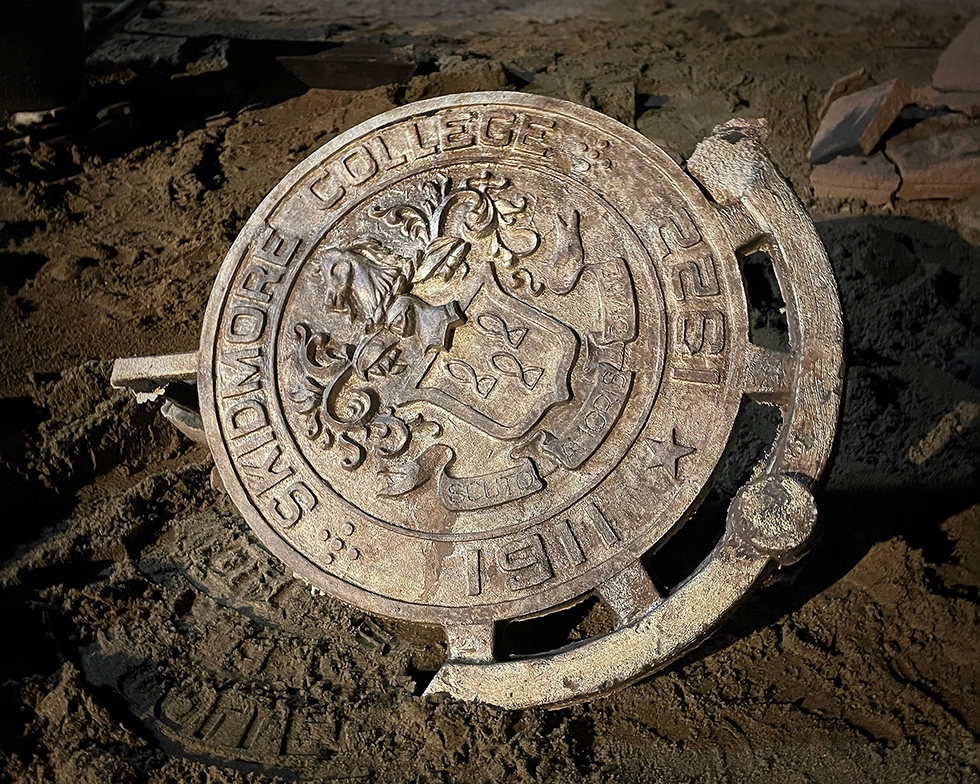
Our history
Founded on the belief that a daring education rooted in creativity best prepares students to meet the challenges of the future, Skidmore College has long advanced a spirit of bold exploration that has fueled everything from interdisciplinary academics and research to a deep commitment to fostering a dynamic, inclusive community.
The beginning of a bold idea
In 1903, Lucy Skidmore Scribner (1853-1931), a woman of quiet strength and boundless vision, founded the Young Women’s Industrial Club in Saratoga Springs, New York, with a clear purpose: to provide young women with the skills and knowledge to become independent and self-sufficient. The curriculum mixed practical courses like bookkeeping and textile arts with creative and intellectual pursuits — a foundation that would become Skidmore’s enduring “mind and hand” tradition.
 Skidmore College's founder, Lucy Skidmore Scribner (1853–1931), on the steps of her
home, what we call Scribner House today.
Skidmore College's founder, Lucy Skidmore Scribner (1853–1931), on the steps of her
home, what we call Scribner House today.
Despite humble origins, the school thrived, and in 1911, the New York State Board of Regents granted it a provisional charter as the Skidmore School of Arts. With that transformation came a broader academic vision. In 1922, under the leadership of Skidmore’s first president, Charles Henry Keyes (1912–1925), Skidmore College was officially established and issued its first four-year degrees.
 Skidmore College's predecessor institution, the Young Women's Industrial Club, founded
in 1903.
Skidmore College's predecessor institution, the Young Women's Industrial Club, founded
in 1903.
Skidmore expanded its liberal arts curriculum, adding programs in the humanities, arts, sciences, and other fields. The College also built an innovative liberal arts-based nursing program, blending science with humanities in a way that prefigured the interdisciplinary ethos Skidmore embraces today. Despite the challenges posed by the Great Depression and World War II, Henry T. Moore (1925-1957) helped Skidmore to grow and ascend to a leading position in women's education. By the time of his retirement in 1957, the College had outgrown its scattered buildings in downtown Saratoga Springs. The moment had arrived for its next leap forward.
‘Make no small plans’
With growth came the need for reinvention. In 1961, thanks to a generous land donation
from Trustee J. Erik Jonsson, President Val H. Wilson (1957–1965) and College leadership
embraced an audacious idea: the construction of a new campus. Board of Trustees Chair
Josephine Young Case rallied support for the monumental project with the phrase “Make
no small plans,” an expression of Skidmore’s daring and creative vision for the future.
Construction of the new campus began in 1963, and over the next two decades, students
and faculty gradually transitioned from Skidmore’s historic downtown buildings to
a modern yet lush campus two miles away.
The transition coincided with another defining transformation: The College welcomed
its first coeducational class in 1971. This shift also reinforced Skidmore’s belief
in an expansive, inclusive learning environment. Embracing a mission to ensure access
to as many deserving students as possible, Skidmore was a pioneer in New York state’s
Higher Education Opportunity Program (HEOP), and an estimated 1,200 Opportunity Program
students have graduated since 1973.
The tenure of President Joseph Palamountain (1965–1986) was also marked by academic
innovation. Skidmore expanded faculty research opportunities and introduced new programs
that prepare students for careers in a rapidly changing world. Skidmore had firmly
established itself as a leader in creative, interdisciplinary education.
As he charted Skidmore’s course to the 21st century, President David Porter (1987–1998)
maintained Skidmore’s commitment to its liberal arts tradition and academic rigor.
Jamienne S. Studley (1999-2003) prioritized academic quality and faculty-student interaction,
bringing new students to campus, and strengthening community.
A creative present and promising future
Skidmore has continued to evolve while staying true to its motto, Creative Thought
Matters.
In 2000, the renowned Tang Teaching Museum and Art Gallery opened its doors. It offers
a space where students engage with art and ideas in ways that challenge perspectives
and spark new ways of thinking across disciplinary bounds.
Skidmore deepened its interdisciplinary focus during the 17-year presidency of Philip
A. Glotzbach (2003-2020). Creative Thought Matters also took firm root as the College’s
motto, encapsulating Skidmore’s commitment to an education that blends imagination
with intellectual depth.
In 2010, Skidmore opened the Arthur Zankel Music Center, a state-of-the-art performance
and teaching space that has transformed the musical and cultural life of the College
and the broader Saratoga Springs community.

Today, Skidmore builds on a legacy of innovation, inclusion, and future-oriented thinking. President Marc C. Conner (2020-present), who joined Skidmore at the height of the COVID-19 pandemic, has said his highest aspiration is to build “a community of trust, a place where everybody feels at home, everybody feels they can thrive, and everybody feels safe enough to challenge and be challenged by an education that we know is daring.” Under his leadership, Skidmore has maintained an ambitious program for the College’s future.
Completed in 2024, the Billie Tisch Center for Integrated Sciences represented the largest project in Skidmore’s history since the construction of its new campus. With new investments in student wellness and athletics, including the completion of McCaffery-Wagman Tennis and Wellness Center in 2025; enduring efforts to grow financial aid; and an emphasis on sustainability, the College is preparing students not just for careers, but for lives of meaning and impact.
From its modest beginnings in 1903 to its dynamic present, Skidmore College has always been about more than just taking classes. It’s about possibility. It’s about transformation. And above all, it’s about the power of creative thought to shape the world.